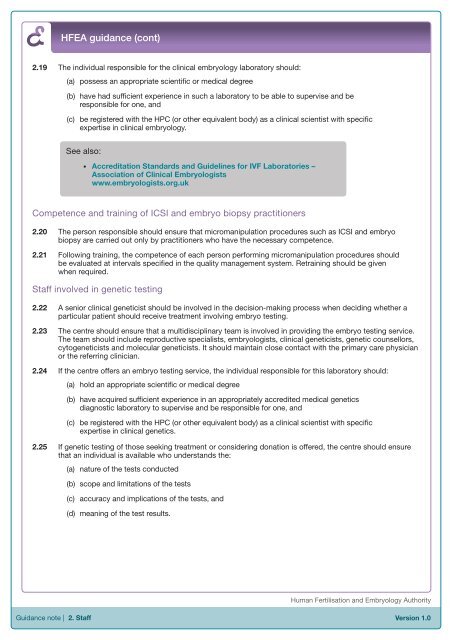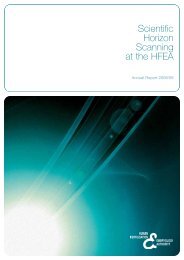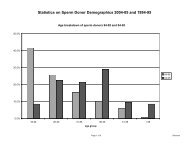- Page 1 and 2: Code of Practice 8TH EDITION This C
- Page 3 and 4: Contents User guide to the Code Reg
- Page 5 and 6: Contents Facilities and administrat
- Page 7 and 8: User guide to the Code Guidance not
- Page 9 and 10: 1. Person responsible This guidance
- Page 11 and 12: XX. Title of Guidance Note Mandator
- Page 13 and 14: 2. Staff This guidance note contain
- Page 15: v HFEA guidance (cont) 2.3 All staf
- Page 19 and 20: 3. Counselling This guidance note c
- Page 21 and 22: = HFEA guidance (cont) Interpretati
- Page 23 and 24: 4. Information to be provided prior
- Page 25 and 26: HFEA guidance (cont) Interpretation
- Page 27 and 28: 5. Consent to treatment, storage, d
- Page 29 and 30: Mandatory requirements (cont) Proce
- Page 31 and 32: HFEA guidance Consent to use and st
- Page 33 and 34: HFEA guidance (cont) (c) (d) they w
- Page 35 and 36: HFEA guidance (cont) Additional con
- Page 37 and 38: HFEA guidance (cont) Interpretation
- Page 39 and 40: HFEA guidance (cont) Mandatory requ
- Page 41 and 42: HFEA guidance (cont) Mandatory requ
- Page 43 and 44: 6. Legal parenthood This guidance n
- Page 45 and 46: Mandatory requirements (cont) (1) W
- Page 47 and 48: Mandatory requirements (cont) 42 Wo
- Page 49 and 50: Mandatory requirements (cont) (3) S
- Page 51 and 52: Mandatory requirements (cont) (2) T
- Page 53 and 54: v HFEA guidance (cont) See also: H
- Page 55 and 56: HFEA guidance (cont) Parenthood aft
- Page 57 and 58: HFEA guidance (cont) People not to
- Page 59 and 60: HFEA guidance (cont) Information pr
- Page 61 and 62: 7. Multiple births This guidance no
- Page 63: HFEA guidance (cont) 7.5 If a woman
- Page 66 and 67:
HFEA guidance (cont) The welfare of
- Page 68 and 69:
HFEA guidance (cont) Refusing treat
- Page 70 and 71:
Mandatory requirements (cont) T89 (
- Page 73 and 74:
10. Embryo testing and sex selectio
- Page 75 and 76:
Mandatory requirements (cont) T88 (
- Page 77 and 78:
HFEA guidance (cont) Preimplantatio
- Page 79 and 80:
HFEA guidance (cont) Mandatory requ
- Page 81 and 82:
HFEA guidance (cont) Interpretation
- Page 83 and 84:
11. Donor recruitment, assessment a
- Page 85 and 86:
Mandatory requirements (cont) (9) I
- Page 87 and 88:
HFEA guidance (cont) 11.3 Unless th
- Page 89 and 90:
HFEA Mandatory guidance requirement
- Page 91 and 92:
HFEA Mandatory guidance requirement
- Page 93 and 94:
HFEA Mandatory guidance requirement
- Page 95 and 96:
12. Egg sharing arrangements This g
- Page 97 and 98:
HFEA guidance (cont) Consent 12.7 T
- Page 99 and 100:
HFEA guidance (cont) 12.19 The agre
- Page 101:
HFEA guidance (cont) 12.31 If eggs
- Page 104 and 105:
HFEA guidance (cont) 13.1 HFEA Dire
- Page 106 and 107:
Mandatory requirements (cont) (b) a
- Page 108 and 109:
HFEA guidance (cont) See also guida
- Page 110 and 111:
Mandatory requirements (cont) Direc
- Page 112 and 113:
HFEA guidance (cont) 15.4 Sperm sho
- Page 114 and 115:
HFEA guidance (cont) Processing and
- Page 116 and 117:
HFEA guidance (cont) 15.16 (cont) (
- Page 118 and 119:
Mandatory requirements (cont) (4) D
- Page 120 and 121:
HFEA guidance (cont) General Direct
- Page 123 and 124:
17. Storage of gametes and embryos
- Page 125 and 126:
Mandatory requirements (cont) (2) N
- Page 127 and 128:
Mandatory requirements (cont) (3) (
- Page 129 and 130:
Mandatory requirements (cont) (b) e
- Page 131 and 132:
v HFEA guidance (cont) 17.10 In add
- Page 133 and 134:
v HFEA guidance (cont) Mandatory re
- Page 135 and 136:
18. Witnessing and assuring patient
- Page 137 and 138:
HFEA guidance (cont) 18.4 (cont) (j
- Page 139 and 140:
HFEA guidance (cont) 18.24 Centres
- Page 141:
HFEA guidance (cont) Risk assessmen
- Page 144 and 145:
Mandatory requirements (cont) T99 (
- Page 147 and 148:
20. Donor-assisted conception This
- Page 149 and 150:
Mandatory requirements (cont) (2) (
- Page 151 and 152:
v HFEA guidance (cont) See also gui
- Page 153:
HFEA guidance (cont) 20.11 (cont) (
- Page 157 and 158:
22. Research and training This guid
- Page 159 and 160:
Mandatory requirements (cont) (3) A
- Page 161 and 162:
Mandatory requirements (cont) (3) W
- Page 163 and 164:
Mandatory requirements (cont) T95 T
- Page 165 and 166:
HFEA guidance (cont) Information pr
- Page 167 and 168:
HFEA guidance (cont) Consent Interp
- Page 169 and 170:
HFEA guidance (cont) Mandatory requ
- Page 171 and 172:
HFEA guidance (cont) Mandatory requ
- Page 173 and 174:
HFEA guidance (cont) Mandatory requ
- Page 175 and 176:
HFEA guidance (cont) Mandatory requ
- Page 177 and 178:
HFEA guidance (cont) Interpretation
- Page 179 and 180:
HFEA guidance (cont) Mandatory requ
- Page 181 and 182:
HFEA guidance (cont) Mandatory requ
- Page 183:
HFEA guidance (cont) Human admixed
- Page 186 and 187:
XX. Title of Guidance Note Mandator
- Page 188 and 189:
HFEA guidance (cont) 23.10 Centre m
- Page 190 and 191:
XX. Title of Guidance Note HFEA gui
- Page 193 and 194:
24. Third party agreements This gui
- Page 195 and 196:
Mandatory requirements (cont) T117
- Page 197 and 198:
25. Premises and facilities This gu
- Page 199 and 200:
HFEA guidance Definition of premise
- Page 201 and 202:
26. Equipment and materials This gu
- Page 203:
HFEA guidance (cont) See also guida
- Page 206 and 207:
Mandatory requirements (cont) Licen
- Page 208 and 209:
HFEA guidance (cont) 27.4 A ‘near
- Page 211 and 212:
28. Complaints This guidance note c
- Page 213 and 214:
29. Treating people fairly This gui
- Page 215 and 216:
HFEA guidance (cont) 29.9 Staff at
- Page 217 and 218:
30. Confidentiality and privacy Thi
- Page 219 and 220:
Mandatory requirements (cont) (j) (
- Page 221 and 222:
Mandatory requirements (cont) 35 Di
- Page 223 and 224:
HFEA guidance (cont) 30.7 A person
- Page 225 and 226:
HFEA guidance (cont) Consent to dis
- Page 227 and 228:
31. Record keeping and document con
- Page 229 and 230:
Mandatory requirements (cont) T40 T
- Page 231:
v HFEA guidance (cont) 31.4 (cont)
- Page 234 and 235:
Mandatory requirements (cont) (2) (
- Page 236 and 237:
Mandatory requirements (cont) Seizu
- Page 238 and 239:
HFEA guidance Legal obligations tow
- Page 240 and 241:
Glossary D Data subject: Defined by
- Page 242 and 243:
Glossary N Near miss: Any occurrenc
- Page 244 and 245:
Glossary S Serious adverse reaction
- Page 246 and 247:
Index C carrier embryos, transfer o
- Page 248 and 249:
Index donation for research/trainin
- Page 250 and 251:
Index of justification for use of g
- Page 252 and 253:
Index charges and benefits 12.20 co
- Page 254 and 255:
Index embryonic stem cells/lines se
- Page 256 and 257:
Index preimplantation tissue typing
- Page 258 and 259:
Index L labelling dishes and tubes
- Page 260 and 261:
Index likely, information provision
- Page 262 and 263:
Index identification of processes n
- Page 264 and 265:
Index licence R25(22), 22A, 22.1 An
- Page 266 and 267:
Index additional requirements 5D, 5
- Page 268 and 269:
Index communication barrier handlin

















